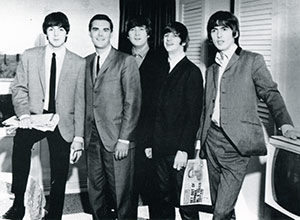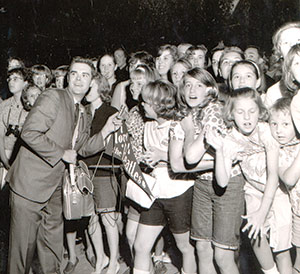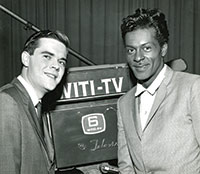John Lennon never met Margaret Doerfler. Too bad. Her perspective may have helped him avoid the controversy his remarks caused in 1966.  On Sept. 5, 1964, the day after the Beatles made their only Milwaukee appearance, Bob Barry had an exclusive interview with the group in their room at the Coach House Inn on 19th and Wisconsin Avenue. The recorder and the tape of the interview were stolen from the hotel corridor, but eventually turned up in the chapel of the School Sisters of St. Francis Convent on Layton Boulevard. (Photo by Bob Lewis, courtesy of Bob Barry)
On Sept. 5, 1964, the day after the Beatles made their only Milwaukee appearance, Bob Barry had an exclusive interview with the group in their room at the Coach House Inn on 19th and Wisconsin Avenue. The recorder and the tape of the interview were stolen from the hotel corridor, but eventually turned up in the chapel of the School Sisters of St. Francis Convent on Layton Boulevard. (Photo by Bob Lewis, courtesy of Bob Barry)
While Lennon contended that he and the Beatles “were bigger than Jesus Christ” – he would later say his words were taken out of context – Margaret had a lived perspective on the Son of God: “Offer everything up to Jesus and you’ll just feel completely different. Your mind will be free and you’ll be at ease. Just give everything to him and he’ll take care of it.”
That’s part of the spiritual direction she instilled in her son, Bob, aka Bob Barry. From February 1964 onward, thanks to the following his nighttime shift at WOKY radio garnered, his show became the place to hear the latest music from and information about Lennon and his band mates. In listeners’ minds and ears, he was “Beatle Bob” and Milwaukee’s “Fifth Beatle.”
Those monikers were solidified Sept. 4, 1964, when he introduced the Beatles at a packed arena during their only Milwaukee appearance, and interviewed them the following day in their room at what was then the Coach House Inn on 19th Street and Wisconsin Avenue.
 As fans waited for the Beatles to arrive at Mitchell Field, Sept. 4, 1964, Bob Barry used the opportunity to interview them. The crowd never got a glimpse of the group as police had their plane land at the National Guard air strip. (Photo by Bob Lewis, courtesy of Bob Barry)While the Milwaukee concert was one of dozens the Beatles would play as they made their impact upon a generation, a culture and the world, it was a life-changing moment for Barry.
As fans waited for the Beatles to arrive at Mitchell Field, Sept. 4, 1964, Bob Barry used the opportunity to interview them. The crowd never got a glimpse of the group as police had their plane land at the National Guard air strip. (Photo by Bob Lewis, courtesy of Bob Barry)While the Milwaukee concert was one of dozens the Beatles would play as they made their impact upon a generation, a culture and the world, it was a life-changing moment for Barry.
“Definitely. I didn’t realize it at the time. I figured it should be fun. Kids were going nuts,” he told the Catholic Herald during a Feb. 5 interview at his Hartland home. “I never thought 50 years later we’d be sitting here talking about it.”
Barry continued, “Parents were down on it. I remember a priest said, ‘This is just a fad; I wouldn’t get too excited about it.’”
Rooted in faith
Although Barry had 12 years of formal Catholic education – eight years at St. Sebastian Grade School, first two years of high school at Saint Francis Minor Seminary, and two years at Messmer, from which he graduated in 1956 – he credits one person in particular for his spiritual formation.
“My mother was responsible for my faith,” he said.
Divorced from his father, Barry’s mother “prayed that he (her ex-husband) would come to his senses and come back.”
A daily Mass attendee, Margaret also went to Mother of Perpetual Help devotions at St. Sebastian Parish and visited the Fatima Shrine on 68th and Stevenson streets. Her son accompanied her to both.
Boppin’ in and out of CYO dances During the mid-’60s to the early ’70s, WOKY and WRIT encouraged their announcers to make appearances at parish CYO and high school dances as a way of increasing the stations’ visibility. In the week leading up to the dance, DJs would mention on the air where they’d be appearing that Friday as a way of helping promote the event. |
“There (the shrine) we went to the cloistered nuns. I met Sr. Mary Joseph. She was a big, big inspiration to me,” he said. “When I’d think about doing something I probably shouldn’t do, I’d think about Sr. Mary Joseph saying, ‘Now, Robert, live a good life and Jesus will reward you.’ You remember things like that.”
His mother, whom Barry described as “incredible” and “very faith-filled,” lived to be 96.
“I always felt that when she died (in 2000), she’d go directly to heaven. And she’d say, ‘No, no, I need to do a lot of things. I’m not perfect; I need to correct a lot of things.’ She was always modest about it. She didn’t realize what she was doing for me,” he said.
Road to radio
Barry uses the word “encouragement” when he talks about getting into broadcasting. Noticing that he listened to the radio “all the time,” and that he imitated Milwaukee Braves’ broadcaster Earl Gillespie, his parents bought him a Wilcox-Gay Recordio on which the future announcer and his friends enjoyed recording onto the machine’s plastic disks.
During two years at UW-Milwaukee, Barry was encouraged by a speech professor to go into broadcasting. He also received encouragement from professors at the Milwaukee Institute of Technology where he took a TV course.
Through a grade school friend’s father, who owned part of WTKM radio in Hartford, Barry was able to get an interview with the station manager, who offered him a sales job in 1959.
“The entire summer I made $500 in commission,” he said.
Eventually he filled the noon to sign-off shift at WTKM, where he was heard by the program director from WEMP, Milwaukee, who was driving around, listening to the radio in his search for a new announcer. Bob Barry interviewed celebrities at WOKY radio and for WITI, Channel 6, during the early ‘70s. He is pictured at a Milwaukee nightclub, The Scene, with Chuck Berry. (Photo courtesy of Bob Barry)
Bob Barry interviewed celebrities at WOKY radio and for WITI, Channel 6, during the early ‘70s. He is pictured at a Milwaukee nightclub, The Scene, with Chuck Berry. (Photo courtesy of Bob Barry)
“So, I get a call from him, saying, ‘Do you want to do the all-night show at WEMP?’” Barry recalled.
That gig lasted until a former WEMP announcer returned to the station, which replaced Barry with him. He went to WRIT for a couple of months until the station eliminated announcers by automating.
“I took a job for $80 a week in the promotions department at the Milwaukee Sentinel,” he said. “I worked at the Sentinel until they went on strike (in 1962).”
At a party for the Schlitz Circus Parade, Barry met the manager of WOKY, who offered him a vacation relief position, and soon thereafter a full-time job working midnight to 6 a.m. He would eventually work every shift at the station.
“When I was working nights, Frank Fried, promoter of the Beatles’ show, asked me if I wanted to emcee the Beatles’ show,” Barry said. After initially refusing the non-paying gig, he, encouraged by the station’s music director, Arline Quier, changed his mind.
Career soars
While emceeing the Beatles concert was a milestone for Barry, he noted that it didn’t make or break his career.
Here, there and everywhere Fifty years after their U.S. debut, the Beatles are still – indirectly – a part of Bob Barry’s life. The interview he did with them in 1964, as well as some of the interviews he did with other celebrities over the years, is available on CD for $12.50, postage paid, and DVD for $17.50 postage paid. Proceeds from the sales are donated to charity. Checks may be sent to P.O. Box 151, Nashotah, WI 53058. |
“The Beatles were a part of it, but I wouldn’t put my whole career on it,” he said. “I think my peers would agree.”
Barry added that when he started working the morning show at WOKY in 1970, “things were really popping for me” – things unrelated to the Beatles.
“When I won the national Billboard (Magazine Top 40 Air Personality of the Year) award in ’75, that had nothing to do with the Beatles,” he said. “The Wisconsin Broadcasters’ Hall of Fame (2001) recognized what I did in Milwaukee.”
The popularity of air personalities can often be gauged by the amount of interest they attract from stations in larger markets. In Barry’s case, offers came from Cleveland, Minneapolis, Los Angeles and Chicago – shortly after he had received the Billboard award.
“Chicago was the only one I really took time (to consider),” he said, noting the position involved a daily split shift – 2-4 p.m. and 7-9 p.m. “I just didn’t want to move the family to Chicago. I thought, ‘This is not the thing for them.’”
Test of faith
Barry remained in Milwaukee but changed stations in 1976.
“I made the big mistake of going to WEMP, and that just didn’t turn out the way they said it was going to be,” he recalled. “They changed formats, and fired Joe Dorsey and Rob Thomas – all the guys that were on the air at that time. I thought they were just going to hire me. They played MOR (middle of the road music); it would have been fine. They went nuts.”
When “everything started to fall apart,” Barry again heeded his mother’s advice; he prayed about it.
“It helped. It was really tough. Things were coming at me from all angles at that time,” he said. “It tests your faith. You ask, ‘Why is all of this happening?’ You get through it.”
It took three years, but Barry was able to buy out his WEMP contract. He returned to WOKY, which was airing a different format.
“They were playing ‘The Music of Your Life,’” he said. “I could keep my personality, play their music and adjust accordingly.”
‘I could never retire’
While some websites list Barry as retired, he said that isn’t true.
“I could never retire; I have to be doing something,” he said.
He does a weekly TV show for Rosen Nissan and still records radio spots and does voice over work. He is also involved in charity work and the Milwaukee Braves Association.
He and his wife of 45 years, Nancy, are members of St. Charles Parish, Hartland – his voice is heard on the parish’s answering machine. Their son lives in Miami, where he works for Royal Caribbean Cruises. Their daughter is a social worker in the Pewaukee area.
Were they awed by the limelight their father enjoyed?
“They were not impressed,” he said with a laugh. “Maybe more so now, with all that is going on, they’re enjoying it.”
While the walls of his office/studio are covered with photos of celebrities he has met and with awards with which he’s been honored, two things mean more to Barry.
“My faith. My wife is a convert; I’m very happy about that and proud that she’s become a very good Catholic,” he said. “I’m proud of my family and what they’ve accomplished.”
Asked if he had any regrets, Barry reiterated what he said when he was inducted into the Wisconsin Broadcasters’ Hall of Fame.
“If I had to do it over again, I wouldn’t change anything. I think we all have regrets in our life, but we have to look beyond it. We have to forget it. Otherwise, it’s going to gnaw at you the rest of your life. Yeah, I have them (regrets). I don’t know if it could have been different.”
He paused, then added, “I’ve been lucky and blessed that I made it this far.”
